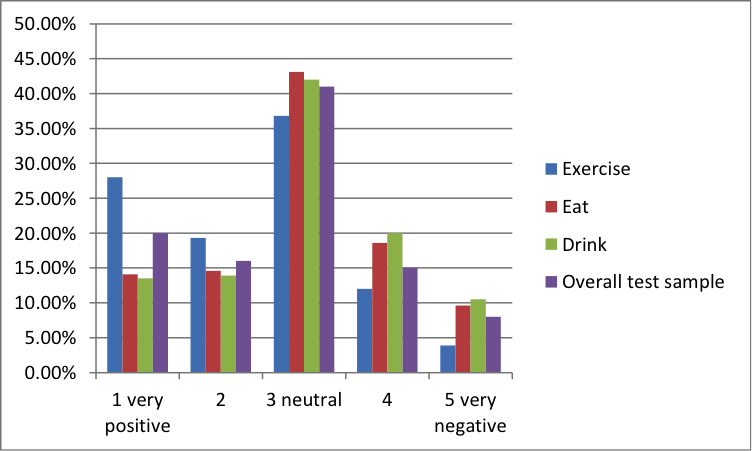*This is the fourth instalment in our series of articles exploring the findings of the Female Nation She Says Survey. Catch up on part one, two and three.
How do South African women feel about their bodies?
We asked the 16 000 local women who took part in our She Say Survey to rate how they feel about their bodies on a scale of 1 to 5 where 1 is very positive, 3 is neutral and 5 is very negative. 20% of women overall said they felt very positive about their bodies and just 8% said they felt very negative. The remaining 72% fell in the slightly positive (16%), neutral (41%) and slightly negative (15%) categories.
READ MORE: I'm fatter - and so much happier!
That means almost 1 in 4 women feel negative about their bodies, just over 1 in 3 feel positive, and the rest are neutral. The age group with the highest percentage (24%) respondents of women who say they feel very positive about their bodies is the 51 – 61 group, and those with the lowest percentage (17%) is the 31 – 35 group.
Interestingly enough, despite the seeming dissatisfaction with their bodies, this group (women in their early thirties) are the demographic who is having the most sex.
READ MORE: Less than half of SA women are happy with their sex lives
W24 spoke to Jerusha Sukhdeo, the Head of Video at News24 and MBA student at WITS about whether she was surprised at the low number of women in their 30s who feel positive about their bodies.
“I was surprised to see so many women in their early 30s express a negative sentiment about their bodies. I’ll be 30 in a few months and while I’m definitely a few kilos heavier than I was 10 years ago; I am monumentally more confident and self-assured than 20-year-old Jerusha (who – infuriatingly – believed she was fat).”
When we asked them about their relationship with food, the picture was a bit more complex. While only 1.3% identified with having an eating disorder, 13% said they have a complicated relationship with food and 47% said they loved food but wish they were thinner.
That’s almost half of SA women wishing they were thinner. If we compare this with the findings of a recent study done by Healthdata.org where they found that the obesity rate among SA women is 42% - highest of all sub-Saharan countries in Africa – one can’t help wondering whether it is perhaps that same demographic that would like to lose weight?
Of course, this might not be the case at all. With the intense pressure on women to attain standards of beauty that are often unrealistic and unhealthy, I wouldn’t be surprised if many of these women who wish to be thinner are actually of perfectly healthy weight and merely wish to be thinner because that is what they have been conditioned to want.
We asked Sukhdeo what her thoughts were around this lack of positive self-esteem.
“I can’t help but wonder if some of the results have to do with the unrelenting and unnecessary pressure women in their early 30s (and I’m counting myself here) experience daily. We’re young enough to feel pressured by perfectly-curated Instagram accounts and social media influencers; and “old” enough to be fielding unfair and unsolicited questions about getting married, having babies and where we should be in our careers.
“Frankly, it’s maddening that only 17% of us feel very positive about our bodies. I wish I was among that 17% but, to my shame, I too have days when I wish I was thinner and taller. I am forcing myself to remember this: my body is amazing. It’s what helps me succeed at an incredibly fast-paced, stressful job.
It allows me to study after hours too. It makes me where I need to go. With it I can care for the people I love. My body is amazing and losing a few kilograms won’t change that.”
How do eating, drinking and exercise habits influence body image?
There seems to be a significant relationship between a person’s coping mechanisms and how they feel about themselves.
In order to explore this we filtered the body image answers according to three different sets of criteria: Group 1 is the respondents who exercise to relax. Group 2 is the respondents who drink to relax. Group 3 is the respondents who eat to relax.
As you can see from the graph, positive associations are significantly higher and negative associations significantly lower among those who exercise to relax when compared to both the other test groups and the overall sample.
The inverse is true for the other two groups: those who said they eat or drink to relax are markedly less positive about their bodies.
READ MORE: Are almost 1 out of 2 SA women obese?
Of course, this could be a chicken and egg argument – does exercise make women feel more positive about their bodies or are women who already feel positive about their bodies more likely to exercise? A bit of both, I’d think.
Similarly, are women who use food or alcohol to relax generally more likely to feel negative about their bodies, or does food and alcohol as coping mechanism cause women to feel more negative? Once again, both arguments have merit.
Either way, these findings have certainly inspired me to choose a brisk walk over a glass of wine the next time I feel stressed.




 Publications
Publications
 Partners
Partners















